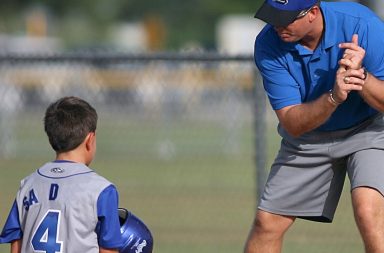You have never coached in your life, and you have volunteered/been nominated/been conscripted to do so. Relax! The fact that you are here, looking for help, puts you ahead of ninety-five percent of potential youth baseball coaches. Rather than focus on specific drills or practice methods (you can find those everywhere), we will focus on concepts and other tips born of experience.
Odds are, you’ll have a list of players and telephone numbers provided by your league. The first thing you’ll need to do is to call all of your parents and introduce yourself. Call a team meeting within the next couple of days, at a time of day that will be similar to your practice times. It’s a great idea to ask to speak to the player themselves – two minutes of talking to the coach on the phone can really fire up a player’s enthusiasm.
At your first meeting, shake everyone’s hand and introduce yourself. Spend five or ten minutes explaining your expectations and general rules for the season, then take your players aside.
What, you don’t have any rules or expectations? You really should try to clarify these before you ever meet your team. Different coaches do things different ways, but the following are suggested:
1. Players should attend every practice unless they are ill or have another legitimate reson (school function, illness, etc.). Your team will only hae so many practices over the course of a season, and even at the coach pitch level, they are all important.
2. Players should exhibit respect for the coaching staff, the umpires, and one another. Bad attitudes will not be tolerated. Explain clearly that bad attitudes will result in discipline such as laps, pushups, reduced playing time, etc – and stick to this. Sit your star shortstop if he spends his life making his teammates miserable. You’ll have the respect of your players, have a happier team, and possibly teach the young man a valuable life lesson.
3. Once they step on the field, players are expected to pay attention! My daughter had a outstanding coach in her first two years of softball – the man seemed to always coach the first place team, despite having less talent, year in and year out. He once told me that holding the attention of his players was the key. “On a team of twelve kids,” he’d say, “I’ll have nine that can hit, eight that can field, and three can can pay attention.”
4. Related to number three, players are always expected to put in their best effort. Let them know that they can strike out, they can miss balls, they can make mistakes… as long as they are trying their best. Baseball will be fun, but it is not playtime. Players and parents alike should understand that, as a team sport, baseball requires players to rely on one another. If someone is goofing off, they hurt everyone on the team. We all understand that the team is comprised of kids, but that doesn’t mean they are free from expectations. You expect them to do their part and to put effort into games and prctices.
5. Parents should be free to discuss their concerns with you (and don’t worry, they will!) – but only after practice, after games, or with a call to your home. Never, ever have a confrontation about little Johnny’s playing time during a practice!
Field any questions your parents may have, then take your team aside. Pull them into a huddle, and speak quietly to them. Tell them that you are excited about the season (you are, aren’t you?), that you are glad to have each of them on your team. Tell them that you will win some games, you will probably lose some games, but you will have a lot of fun, look great in custom baseball uniforms, and you will learn some baseball. Ask them who has played before, and who has not, but don’t concern yourself too much with their answers at this point – you are establishing communication with them by getting them to talk to you away from mom and dad. You’ll use your first real practice to evaluate skill and ability, not the fact that Billy has played t-ball but Scott has not. End your huddle with a nice “Go Team!” or something similar.
If your league has not assigned assistant coaches and/or a team mom, you need to recruit these now. Check your league guidelines for the number of assistants you are allowed (can be as few as one, can be as many as four – depends on the age group and the league), but try to not turn away any parent who wants to help. Just because you may only be able to keep x number of coaches on the field during games does NOT mean you can’t use parental help in practices – use them to help you run practice stations, shag balls, coach bases, etc.
Do not underestiate the value of a good team mom. I repeat, do NOT underestimate the value of a good team mom. Having someone willing to call all of the parents for you during the course of the season to announce practice times, to set up pizza parties and trips to McDonalds, to coordinate who brings after practice drinks and/or snacks… these things are invaluable to team morale and to keeping your sanity.
On that note, don’t neglect the after game McDonald’s trip or the occasonal post-practice water gun fight. Baseball is and should be the focus, but remember that these are kids, and a little fun goes a long way with them. We’ve had good years and bad years with my children’s teams, and these tend to correlate directly with the amount of extra effort the coaches were willing to give.


